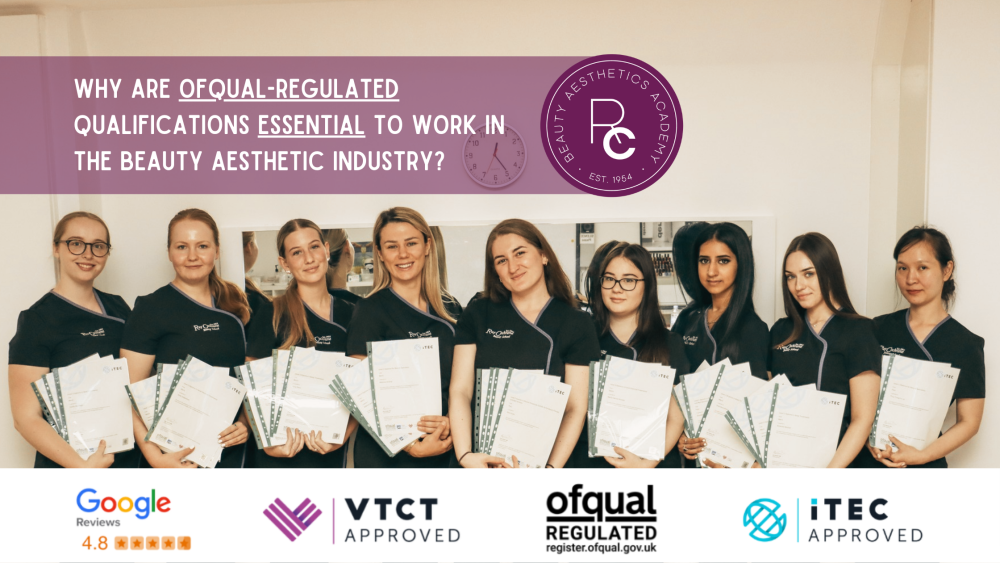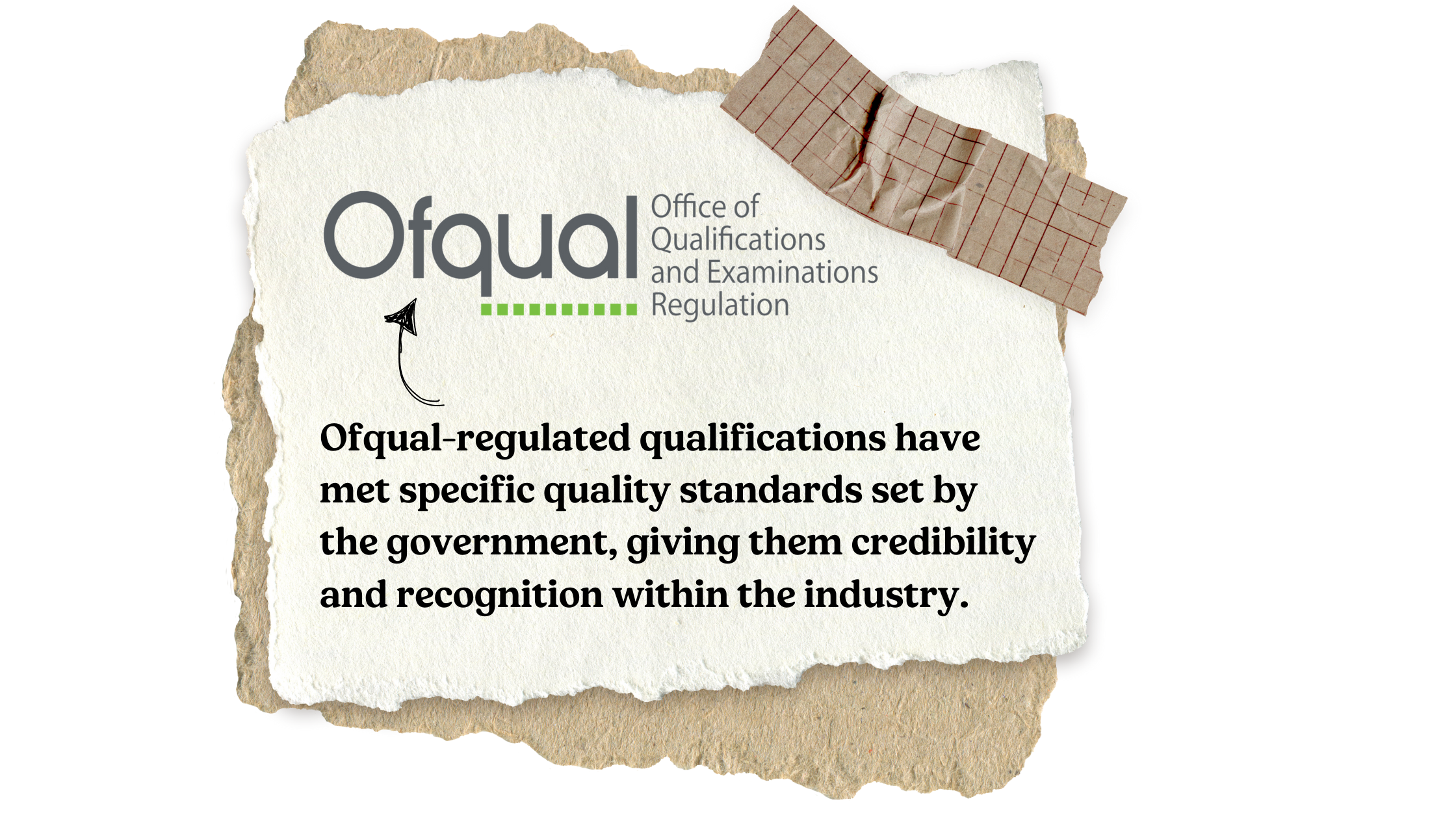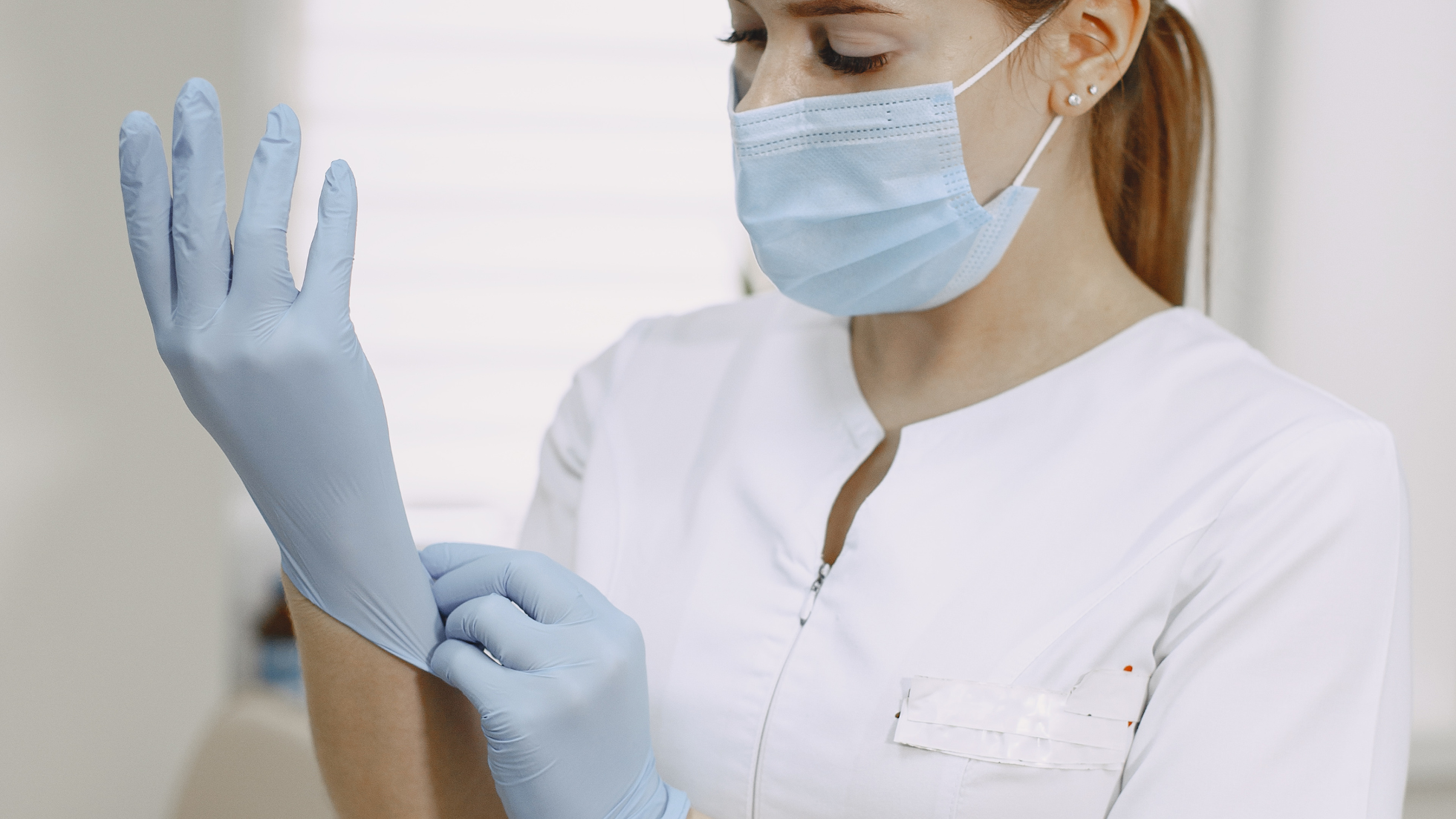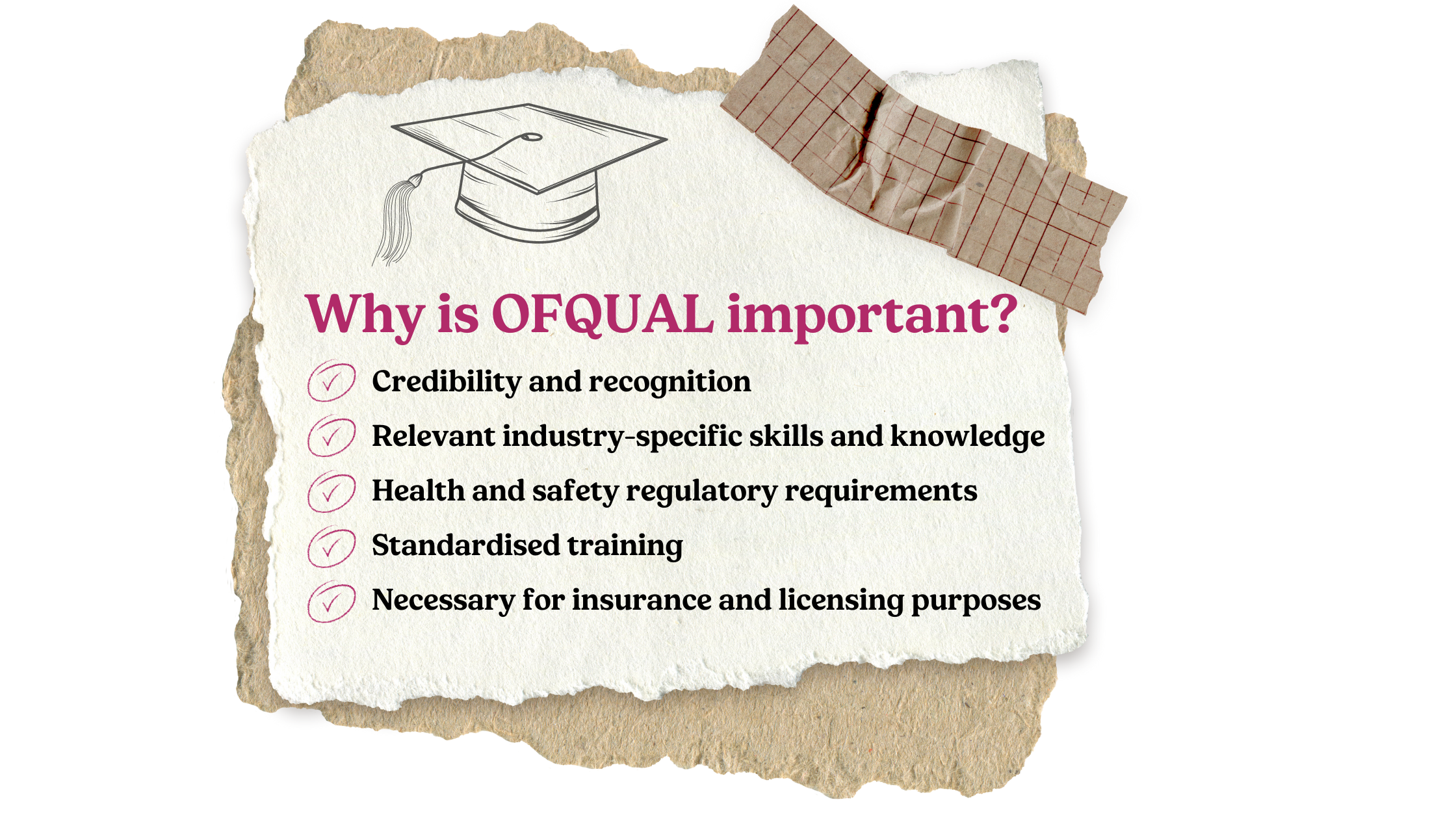
The Beauty Aesthetic industry is a rapidly growing sector with an increasing demand for skilled professionals who are up to date in popular treatments. However, with so many training courses and qualifications available, determining which ones are recognised and valued within the industry can be confusing and time-consuming.
We’ve heard many horror stories from our students who had completed a course in the past, only to find out that it wasn’t recognised and couldn’t be used for licensing or insurance purposes, making it useless.
As we’ve previously shared with our readers, the UK government is considering significant regulation changes that will significantly impact the Beauty and Aesthetic industry, particularly those currently working with unregulated qualifications. This potential legislation change highlights the importance of Ofqual-regulated qualifications.
In this blog post, we will explore the importance & reasons for choosing these qualifications in the beauty aesthetic industry. We will also learn why they are essential not only for anyone looking to work in this field but also for the health and safety of clients receiving these treatments.

What are Ofqual-regulated qualifications?
Firstly, to understand why Ofqual-regulated qualifications are essential, you must understand who Ofqual is and what its authority is in the UK.
The Office of Qualifications and Examinations Regulation, or Ofqual, is an independent government body regulating qualifications, exams, and tests in England.
For a qualification to be recognised as part of the Regulated Qualifications Framework (RQF), it must be created or approved by an awarding body that is acknowledged by one of the government-appointed regulatory bodies. Ofqual is England’s main government-appointed regulatory body regulating school and college qualifications such as GCSEs, A levels, AS levels, and vocational and technical qualifications.
Ofqual-regulated qualifications have met specific quality standards set by Ofqual, giving them credibility and recognition within the industry.
For example, before any new aesthetic/beauty qualification is released to training centres like ourselves to provide to the general public, it is assessed by Ofqual, ensuring it is up to a national standard and relevant to the vocation.
Most of our qualifications at Ray Cochrane are awarded by VTCT, a globally recognised awarding body with centres in 48 countries that provide Ofqual-regulated courses. You might have heard of other popular awarding bodies like Pearsons, AQA, and EDEXCEL, but there are over 200 awarding bodies in the UK.
Awarding bodies do not necessarily provide the training that awards the qualification; instead, they appoint chosen training centres they trust to uphold their standards.
So now that you understand what Ofqual-regulated qualifications are and what roles the awarding bodies and training centres play in providing them, let’s move on to why they are so important.

5 Reasons to choose Ofqual-regulated qualifications to work in the beauty aesthetic industry
There are many reasons why choosing to study an Ofqual-regulated qualification will benefit you as you embark on your journey to working successfully in the beauty/aesthetic industry.
1) Ofqual regulated qualifications are credible and recognised qualifications
One of the main reasons why Ofqual-regulated qualifications are essential for the beauty aesthetic industry is their credibility and recognition. These qualifications undergo rigorous quality assurance processes, ensuring they meet the industry’s standards. Their credibility means potential employers and clients will have confidence in your skills and abilities, making you a more competitive and desirable candidate for job opportunities.
Essentially, you will have a qualification from England’s government-appointed regulatory body that says you are up to their standards.
Ofqual’s credibility and recognition will also benefit you if you take your training abroad to work. Ofqual-regulated qualifications such as GCSE, A levels, and Vocational certificates are accepted abroad or easily converted to the country’s equivalent.

2) Ofqual-regulated qualifications teach relevant industry-specific skills and knowledge
Ofqual-regulated qualifications in the beauty aesthetic industry are carefully designed to provide students with the precise skills and knowledge demanded by the field. These qualifications aren’t just about understanding the bare minimum needed to work in the industry; they delve deep into building long-term skills and insights into the complexities of beauty and aesthetics.
There is so much knowledge to learn when working in the beauty or aesthetic industry, and these qualifications can cover a wide array of industry knowledge that can be overwhelming. However, because a whole team/network is working on creating these qualifications, they ensure that there is just the right amount of information relevant to the roles at each level.
Let’s say you are taught the knowledge and skills needed to work as a junior therapist when studying for a Level 2 qualification. But when you move on to a Level 3 qualification, regardless of whether you train at the same centre or move to a new centre, you are not retaught the same information; instead, you expand on the teachings taught while tailoring them to information relevant for a senior therapist, and so on.
Moreover, these qualifications prepare students for the vast collection of products and the latest technologies in the beauty aesthetic industry. From skincare formulations and understanding skin analysis to laser treatments and microdermabrasion machines, students gain in-depth knowledge of various products and their distinctive applications.

3) Ofqual-regulated qualifications teach health and safety regulatory requirements
Health and safety training requirements are a significant factor in why Ofqual-regulated courses should be the only route for those learning to work in the beauty aesthetic industry.
We have found that there is no in-depth cover of the health and safety behind treatments in many other training courses that are not Ofqual-regulated. Many will teach students the bare minimum they need to work in the industry.
In all Ofqual-regulated beauty and aesthetic training courses, students must complete a unit on health and safety in the salon and understand the contraindications for their chosen treatment. In the health and safety unit, students will learn about the proper PPE required for their services, the importance of working in a well-ventilated area, and how to sterilise and clean equipment.
Learning about contraindications will teach students about conditions and factors that should deter them from completing the treatment, for example, performing laser treatment on someone with psoriasis. These modules are not only there to protect the client from getting injured or harmed while receiving treatment but also to protect the therapist/aesthetician while delivering treatments.

4) Ofqual-regulated qualifications provide standardised training
Another benefit to completing Ofqual-regulated training is the standardised teaching, which ensures what modules courses incorporate. For example, as mentioned above, Ofqual will confirm that students complete health and safety training, practical training and a certain number of guided learning hours when carrying out their studies. This standardised training is very beneficial for students when looking at training centres where they can study, as they can rest assured that if it is an Ofqual-regulated course, the training centre will maintain a certain quality of training.
Another benefit of standardised training is that students, regardless of the college or training centre they have attended, are expected to be trained to the same level if they have completed the same course. Employers find this useful as they can set relevant qualifications as their hiring requirements and expect everyone who has achieved that qualification to be trained on an equal footing with the skills necessary to work the job.

5) Ofqual-regulated qualifications are necessary for insurance and licensing purposes
Having insurance and relevant council licensing is vital when working in the beauty and aesthetic industry. In most councils in London, you will need a special treatment license to work as a Laser therapist, nail technician, microblading artist, tattoo removal specialist and many other specialist treatments.
The special licensing scheme ensures that practitioners are knowledgable, fully trained and work from premises that meet health and safety checks. To prove that you are knowledgeable and fully qualified to get a special treatment license, you musthave a valid qualification from an awarding organisation regulated by Ofqual. The same applies to general or professional liability insurance.
Check out our earlier blog post to learn why you need insurance to work in the beauty and aesthetic industry.

How do I check if my qualification is Ofqual-regulated?
As we’ve outlined, the Ofqual stamp of approval shows students that their course is up to a national standard and employers that they have trained to a high standard.
It’s straightforward to check if your previous qualification is Ofqual-approved. Head over to the Register of Regulated Qualifications and find your qualification! The database is reliable as it is maintained and updated directly by Ofqual.
Alternatively, you can check your certificate to see if you have the Ofqual logo, and you can rest assured that you have completed an Ofqual-regulated course.
Enquire today for more information on Ofqual-regulated qualifications!
At Ray Cochrane Beauty Aesthetics Academy, all Level 2, 3, 4, 5 and 6 qualifications are Ofqual-regulated, so our students can rest assured that they are fully qualified to work in the beauty aesthetic industry.
If you want more advice on choosing the right regulated course for your career goals, contact us today! We are available from 9 to 5 Monday through Friday via email at admission@raycochrane.co.uk or give us a call on 0203 856 8886.
